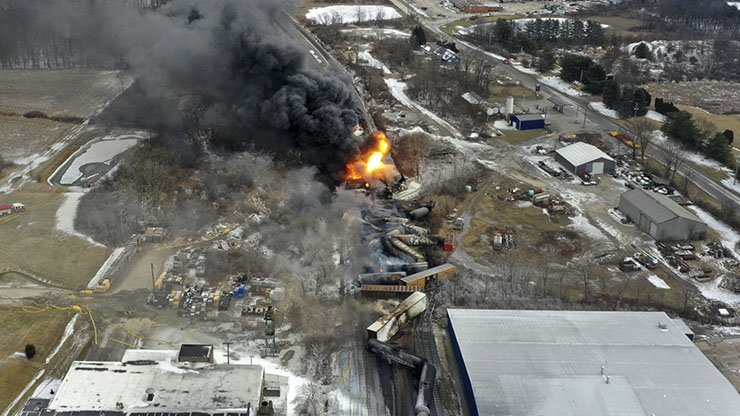Ohio State University students recently organized a rally for Palestine in downtown Colombus. More than a hundred people assembled and agitated beneath Palestinian flags, demanding an end to the distant conflict brewing abroad.
Closer to home, however, there’s another Palestine much more worthy of their concern. That town, East Palestine, is a community of fewer than 5,000 people on Ohio’s border with Pennsylvania, and it’s where a train carrying toxic chemicals derailed in February. Although Americans like these OSU students have moved on, the troubles of those living in East Palestine haven’t ended.
The Norfolk Southern train loaded with a cocktail of carcinogenic chemicals was a behemoth: 151 cars, 9,300 feet long, and weighing 18,000 tons. After it crashed, a decision was made to “vent and burn” the hazardous materials, ostensibly to avoid an imminent explosion. That is what created the ominous black cloud most people came to associate with the incident.
I visited East Palestine shortly after the derailment. It was an eerie time. Crews worked around the clock moving contaminated soil and water out of the area, but locals felt hopelessly anxious. Would they suffer long-term health problems? Would there be help if they did?
I spoke with people who had never lived anywhere else except East Palestine and could not imagine where they would go if they had to move, people who went right back to work in shops thick with a chemical odor after the evacuation order was lifted because they had no other option.
East Palestine is too small to fail for them.
Over the summer, an inquiry led by the National Transportation Safety Board suggested the decision to burn off the cargo may not have been necessary. According to investigators, “tank car temperatures were fluctuating but not warming enough to indicate the chemical reaction was happening.” That lends credence to the idea that Norfolk Southern just wanted the tracks cleared as quickly as possible so the trains could keep on rolling. Trent Conaway, East Palestine’s mayor, told reporters that the train company promised operations wouldn’t restart until all the town’s residents had returned to their homes. That obviously didn’t happen.
Ohio Senators Sherrod Brown, a Democrat, and J.D. Vance, a Republican, have since asked the Environmental Protection Agency to declare a public health emergency in East Palestine so that residents can get the help they need. “The long-term environmental and public health impact of this exposure on residents remains unknown and may not become apparent for years to come,” they wrote in a letter to the agency.
The latest phase of the environmental cleanup entails pumping wastewater from the crash into the ground beneath Coshocton, a town of 11,000 people in Ohio. EPA officials assured the public that the water is treated to be safe enough to drink before it is injected underground. Is it really? Then why put it underground?
What happens if it seeps into an aquifer?
Nobody seems to care. “Appalachia is a sacrifice zone,” said Tim Kettler, a founding member of the Coshocton Environmental and Community Awareness. He’s right.
Long-distance activism isn’t new, and the power of the “current thing” is familiar by now. But demographic change seems another obvious driver of our domestic fixations on foreign affairs. We don’t acknowledge it as much as we should, but it sticks out like a sore thumb in these moments when foreign flags are waving in American streets. Teddy Roosevelt once warned against the day this country might become a “polygot boarding house.” It’s here, and it’s part of the reason people seem to care more about Palestine than East Palestine.

Leave a Reply